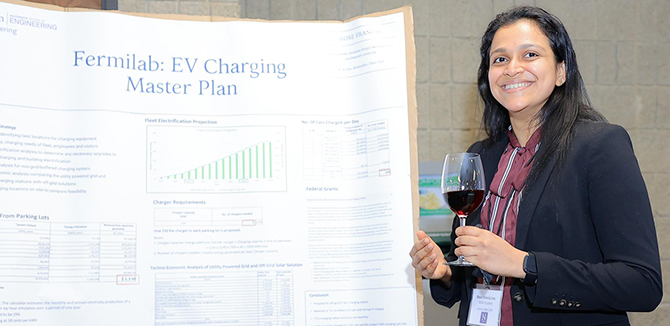Finding Solutions for an EV Transition
A team of MEM students provided assistance on a project at one of the nation’s most important physics labs.
A group of students in Northwestern's Master of Engineering Management (MEM) program recently completed a project that could help researchers at one of the nation’s most important physics labs.
The MEM students partnered with Fermilab – the Batavia, Ill., lab for particle physics and accelerator research funded by the US Department of Energy. There, researchers are working to advance understanding of the fundamental nature of matter and energy by studying the smallest building blocks of the universe and the forces that govern their interactions.
The MEM students’ project focused on creating off-grid solar-powered fast-charging stations for electric vehicles (EV) that reduced noise and aid in the federal government’s transition to an all-EV fleet. A December 2021 executive order from the Biden Administration called for all federal vehicle purchases to be zero-emission vehicles by 2035.
“The opportunity to work with Fermilab was intriguing,” said Rose Francis (MEM ‘24), one of the five MEM students who worked on the extracurricular project. “It was a great learning opportunity, and my work has a direct impact on their operations.”
The students said they felt well-prepared for the project because of their MEM classes, as well as NUvention: Energy – a course taught by MEM Director Mark Werwath and Ian Wiese (MEM '18).
The energy course is one of six experiential NUVention courses offered by Northwestern's Farley Center for Entrepreneurship and Innovation. NUVention: Energy brings together teams from across Northwestern to develop sustainable energy and clean technology solutions for industry partners.
The class, which launched in 2010, is run in collaboration with Northwestern’s Paula M. Trienens Institute for Sustainability and Energy (ISEN).
The MEM students said the work with Fermilab provided ample opportunities to learn and contribute.
“You learn a lot while working with industry experts on solving a problem,” Francis said. “I learned about EV charging infrastructure, federal grants available for such projects, as well as real-life experience on solving a problem with available data and educated assumptions supported by research.”
This type of industry collaboration is at the heart of the NUvention and the MEM program as a whole. The team's work involved:
- A feasibility analysis for the off-grid charging system.
- Investigation into battery requirements to store power provided by the sun.
- A technology study that compared traditional grid-based power generation to off-grid solutions.
The students collaborated with MEM Executive-in-Residence Mark Johnson on the project and were eager to give their own time outside of the classroom.
“MEM students bring diverse industry experiences that bring a fresh perspective to the problem,” Francis said. “Since my interest is in the renewables industry, I wanted to learn more about it through practical experience.”
Having all federal vehicle purchases be zero-emission vehicles will require huge banks of charging stations at government facilities.
Fermilab sits on a 6,800-acre campus and welcomes more than 2,100 employees each day. It also is home to the world’s most powerful particle accelerator, the Main Injector. Experiments at Fermilab delve into some of the most profound questions in particle physics, including the nature of dark matter and the search for new particles.
Francis said working on a project for such an important institution already proved helpful.
“This project is a great conversation starter in interviews,” she said. “It also expanded my network in the renewables space.”


